
-
 Afrikaans
Afrikaans -
 Albanian
Albanian -
 Amharic
Amharic -
 Arabic
Arabic -
 Armenian
Armenian -
 Azerbaijani
Azerbaijani -
 Basque
Basque -
 Belarusian
Belarusian -
 Bengali
Bengali -
 Bosnian
Bosnian -
 Bulgarian
Bulgarian -
 Catalan
Catalan -
 Cebuano
Cebuano -
 Corsican
Corsican -
 Croatian
Croatian -
 Czech
Czech -
 Danish
Danish -
 Dutch
Dutch -
 ភាសាអង់គ្លេស
ភាសាអង់គ្លេស -
 Esperanto
Esperanto -
 Estonian
Estonian -
 Finnish
Finnish -
 French
French -
 Frisian
Frisian -
 Galician
Galician -
 Georgian
Georgian -
 German
German -
 Greek
Greek -
 Gujarati
Gujarati -
 Haitian Creole
Haitian Creole -
 hausa
hausa -
 hawaiian
hawaiian -
 Hebrew
Hebrew -
 Hindi
Hindi -
 Miao
Miao -
 Hungarian
Hungarian -
 Icelandic
Icelandic -
 igbo
igbo -
 Indonesian
Indonesian -
 irish
irish -
 Italian
Italian -
 Japanese
Japanese -
 Javanese
Javanese -
 Kannada
Kannada -
 kazakh
kazakh -
 Khmer
Khmer -
 Rwandese
Rwandese -
 Korean
Korean -
 Kurdish
Kurdish -
 Kyrgyz
Kyrgyz -
 Lao
Lao -
 Latin
Latin -
 Latvian
Latvian -
 Lithuanian
Lithuanian -
 Luxembourgish
Luxembourgish -
 Macedonian
Macedonian -
 Malgashi
Malgashi -
 Malay
Malay -
 Malayalam
Malayalam -
 Maltese
Maltese -
 Maori
Maori -
 Marathi
Marathi -
 Mongolian
Mongolian -
 Myanmar
Myanmar -
 Nepali
Nepali -
 Norwegian
Norwegian -
 Norwegian
Norwegian -
 Occitan
Occitan -
 Pashto
Pashto -
 Persian
Persian -
 Polish
Polish -
 Portuguese
Portuguese -
 Punjabi
Punjabi -
 Romanian
Romanian -
 Russian
Russian -
 Samoan
Samoan -
 Scottish Gaelic
Scottish Gaelic -
 Serbian
Serbian -
 Sesotho
Sesotho -
 Shona
Shona -
 Sindhi
Sindhi -
 Sinhala
Sinhala -
 Slovak
Slovak -
 Slovenian
Slovenian -
 Somali
Somali -
 Spanish
Spanish -
 Sundanese
Sundanese -
 Swahili
Swahili -
 Swedish
Swedish -
 Tagalog
Tagalog -
 Tajik
Tajik -
 Tamil
Tamil -
 Tatar
Tatar -
 Telugu
Telugu -
 Thai
Thai -
 Turkish
Turkish -
 Turkmen
Turkmen -
 Ukrainian
Ukrainian -
 Urdu
Urdu -
 Uighur
Uighur -
 Uzbek
Uzbek -
 Vietnamese
Vietnamese -
 Welsh
Welsh -
 Bantu
Bantu -
 Yiddish
Yiddish -
 Yoruba
Yoruba -
 Zulu
Zulu
Precision CNC Thread Rolling Machine | High Efficiency & Durability
Introduction to CNC Thread Rolling Machines
In modern manufacturing, precision and efficiency are paramount. The cnc thread rolling machine stands as a cornerstone technology for producing high-quality external threads on cylindrical workpieces. Unlike traditional thread cutting or grinding, thread rolling is a cold-forming process that plastically deforms the material, resulting in superior mechanical properties such as increased tensile strength, shear strength, and fatigue resistance. This technology is indispensable across a multitude of industries where robust and reliable threaded components are critical for structural integrity and operational safety.
The evolution of thread rolling machines has seen significant advancements, particularly with the integration of Computer Numerical Control (CNC) systems. These sophisticated controls offer unparalleled precision, repeatability, and versatility, allowing for the rapid production of complex thread profiles with minimal manual intervention. This article delves into the intricacies of these machines, exploring their operational principles, technical specifications, diverse applications, and the tangible advantages they offer to B2B stakeholders.
Industry Trends and Market Dynamics
The global market for thread rolling machines, particularly those equipped with CNC capabilities, is experiencing steady growth driven by the increasing demand for high-strength fasteners and components in critical applications. Key trends include a push towards automation, smart manufacturing integration (Industry 4.0), and the development of machines capable of processing a wider range of exotic materials. The demand for lightweight yet strong materials in aerospace, automotive, and medical industries is further fueling innovation in thread rolling technology.
Furthermore, environmental considerations are leading manufacturers to explore more energy-efficient and material-saving processes. Cold forming, by its nature, produces no material waste in the form of chips, making it an inherently sustainable option. The market is also seeing a rise in specialized machines, such as the flat thread rolling machine for specific fastener types, and hydraulic threading machine variants offering enhanced power and precision for larger diameters and harder materials. The emergence of compact mini thread rolling machine models also caters to workshops and specialized productions requiring smaller footprints without compromising on quality.
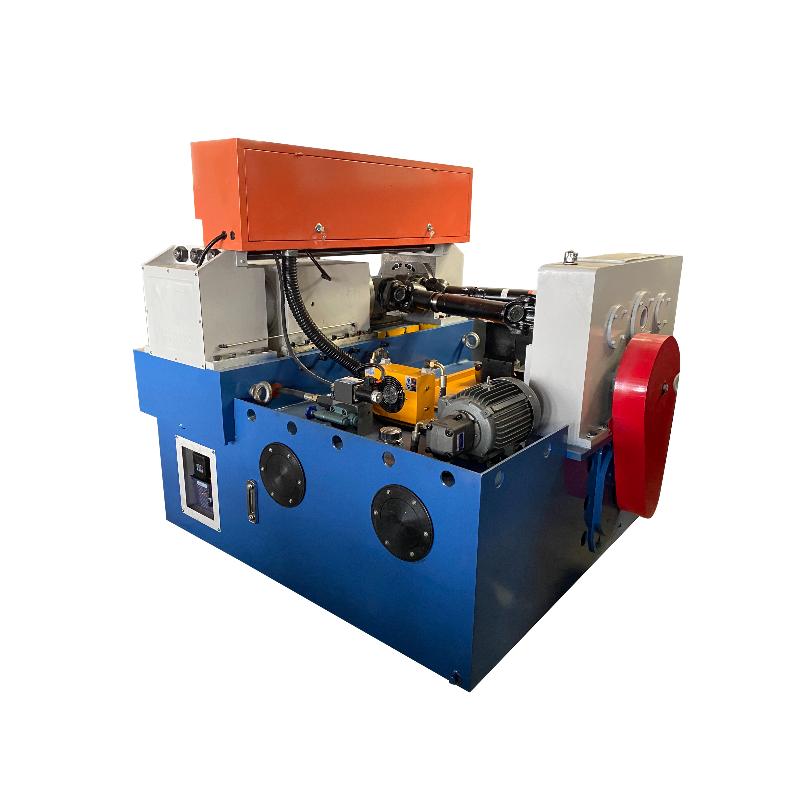
Detailed Process Flow of a CNC Thread Rolling Machine
The manufacturing process for components utilizing a cnc thread rolling machine involves several critical steps, ensuring both geometric accuracy and superior material integrity. Unlike material removal methods, thread rolling compacts and reforms the material, aligning its grain structure with the thread contours, which significantly enhances fatigue life and wear resistance. This cold-forming process is highly efficient and repeatable.
1. Material Preparation:
- Product Materials: Typically, workpieces are made from ductile metals such as low-carbon steel, alloy steels (e.g., 4140, 8620), stainless steels (e.g., 304, 316), aluminum alloys, and brass. The material must possess sufficient ductility to undergo plastic deformation without fracturing.
- Pre-machining: Before threading, the workpiece is machined to its nominal diameter, often slightly below the final pitch diameter, to ensure proper material flow during rolling. Surfaces are typically smooth, with Ra values often below 0.8 μm, to prevent defects during the rolling process.
2. Thread Rolling Operation:
The core of the process takes place within the cnc thread rolling machine. This machine utilizes hardened steel dies with the inverse of the desired thread profile. The workpiece is placed between these dies, which then apply high compressive forces while rotating. The CNC system precisely controls parameters such as roll speed, feed rate, and depth of penetration.
Process Mechanics:
- Loading: The unthreaded workpiece is automatically or manually loaded into the machine's work area, often secured by a fixture or collet.
- Die Engagement: Two or three thread rolling dies (cylindrical or flat) move towards the workpiece. For cylindrical dies, the workpiece rotates as the dies are fed radially. For flat dies, the workpiece is rolled between two reciprocating flat dies.
- Material Displacement: As the dies press into and roll along the workpiece, the material is plastically deformed. Metal is displaced from the roots of the threads to form the crests. This cold working hardens the material in the thread profile, increasing its strength.
- Parameter Control: The CNC system meticulously controls die penetration depth, rotation speed, and feed rate to ensure consistent thread formation and to prevent material tearing or excessive work hardening. Parameters are optimized based on material type, thread size, and desired tolerance.
- Ejection: Once the desired thread profile is achieved, the dies retract, and the finished component is ejected.
3. Post-Processing & Testing:
- Cleaning: Parts may undergo cleaning to remove any residual lubricant or debris.
- Heat Treatment: Depending on the base material and application, post-rolling heat treatments (e.g., stress relieving) might be applied to further enhance mechanical properties or reduce residual stresses.
- Testing Standards: Finished threads are rigorously inspected to ensure compliance with international standards such as ISO (e.g., ISO 965 for metric threads), ANSI/ASME (e.g., B1.1 for unified threads), DIN, or JIS. This includes dimensional checks (pitch diameter, major diameter, minor diameter), lead accuracy, and surface finish. Non-destructive testing methods like eddy current testing may also be employed for critical components.
- Service Life: Threads produced by a cnc thread rolling machine typically exhibit a significantly longer service life compared to cut threads due to the advantageous grain flow and cold work hardening. This translates to enhanced fatigue resistance, particularly crucial in dynamic loading applications.
4. Target Industries and Application Advantages:
The advantages of thread rolling are particularly evident in demanding sectors:
- Petrochemical: Production of corrosion-resistant fasteners and pipeline components where integrity under extreme pressure and chemical exposure is vital. Rolled threads offer enhanced corrosion resistance due to their smooth, unbroken surface and absence of micro-notches, which can be initiation points for stress corrosion cracking.
- Metallurgy: Manufacturing of high-strength studs and bolts for heavy machinery and structural applications, requiring superior load-bearing capabilities.
- Water Supply & Drainage: Creation of robust threaded connections for valves, pumps, and pipe fittings that must withstand continuous pressure and environmental exposure. The energy-saving aspect comes from the cold-forming process itself, which consumes less energy per part than material removal, and the extended service life reduces maintenance and replacement costs.
- Automotive & Aerospace: Critical fasteners, engine components, and landing gear parts where fatigue strength and weight reduction are paramount. The grain flow alignment in rolled threads dramatically improves fatigue life.
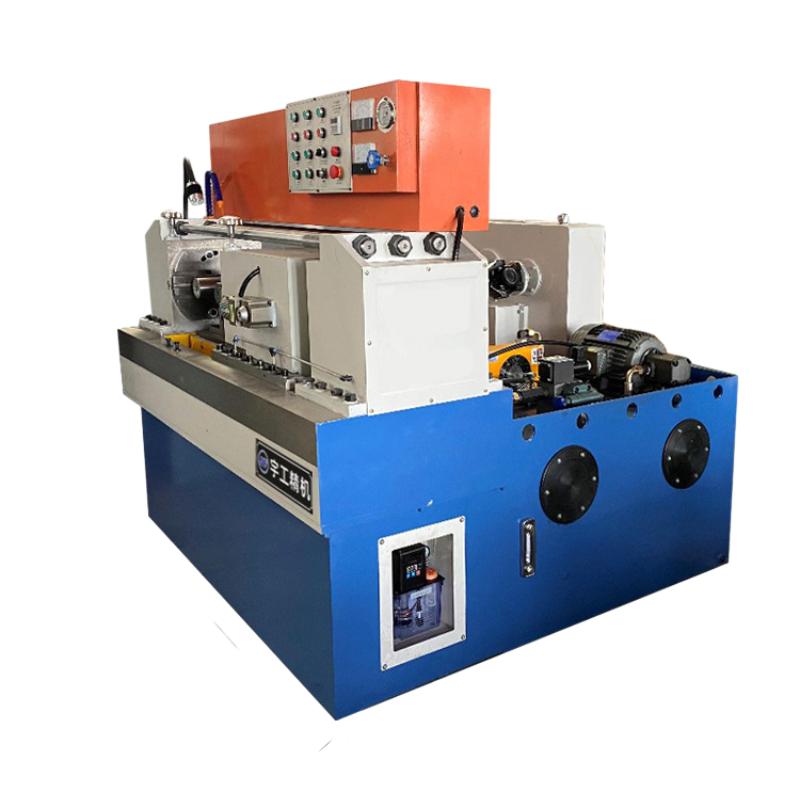
Technical Specifications and Parameters
A modern cnc thread rolling machine is characterized by a range of technical specifications that define its capabilities, precision, and efficiency. Understanding these parameters is crucial for selecting the right machine for specific production needs. Below is a representative table of key specifications:
Typical CNC Thread Rolling Machine Specifications
| Parameter | Value/Range | Description |
|---|---|---|
| Rolling Capacity (Diameter) | Ø 5 mm - Ø 100 mm (0.2" - 4") | Max and min diameter of workpiece that can be threaded. |
| Thread Pitch Range | 0.5 mm - 6 mm (Metric); 8 TPI - 48 TPI (Imperial) | Range of thread pitches (spacing) the machine can produce. |
| Max Thread Length | Continuous / Up to 300 mm (12") | Maximum length of thread that can be rolled in a single pass. |
| Rolling Force | 10 kN - 300 kN (1 ton - 30 tons) | Maximum force applied by the rolling dies. Crucial for material hardness. |
| Spindle Speed | 50 - 200 RPM | Rotational speed of the rolling dies (for cylindrical die machines). |
| Motor Power | 7.5 kW - 30 kW (10 HP - 40 HP) | Electrical power required for machine operation. |
| Control System | Siemens, Fanuc, Mitsubishi CNC | Brand of the Computer Numerical Control system. |
| Machine Weight | 1500 kg - 5000 kg (3300 lbs - 11000 lbs) | Indicates structural rigidity and stability. |
| Accuracy | ISO 965 Class 6g, ANSI 2A | Achievable thread class and tolerance. |
These specifications are crucial for engineers and procurement specialists to assess a machine's suitability for particular production volumes, material types, and thread geometries. Advanced CNC capabilities ensure precise control over all these parameters, minimizing setup times and reducing material waste.
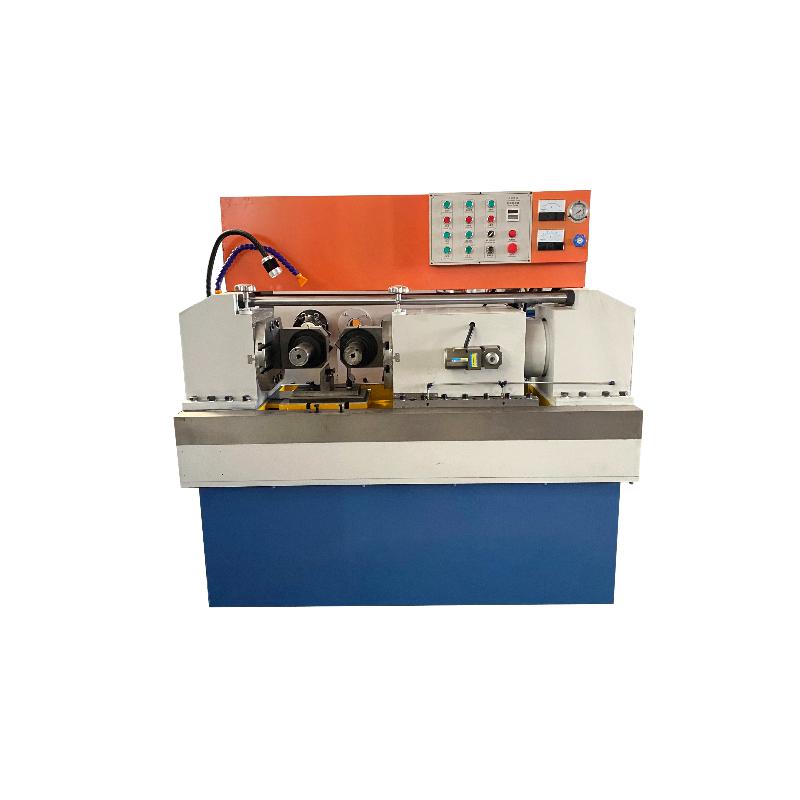
Diverse Application Scenarios
The versatility of the cnc thread rolling machine makes it invaluable across a wide spectrum of industrial applications, driven by the need for high-strength, fatigue-resistant threaded components. Its capabilities extend far beyond standard fasteners to highly specialized applications.
- Automotive Industry: Production of critical engine bolts, wheel studs, steering components, and suspension linkages. Rolled threads enhance fatigue life, crucial for safety-critical parts subjected to continuous vibration and stress.
- Aerospace Sector: Manufacturing of high-strength, lightweight fasteners for aircraft structures, engines, and landing gear. The improved mechanical properties of rolled threads contribute to the overall reliability and safety of aerospace components.
- Construction & Infrastructure: Production of anchor bolts, rebar couplers, and structural fasteners used in bridges, high-rise buildings, and heavy-duty concrete applications. A flat thread rolling machine is often employed here for larger, more robust fasteners.
- Oil & Gas Exploration: Threading of drill pipes, casing, and critical connection elements for offshore platforms and downhole tools. The corrosion resistance and high strength of rolled threads are vital in harsh operating environments.
- Medical Devices: Precision threads for surgical instruments, implants, and prosthetic components where accuracy, biocompatibility, and high-quality surface finish are non-negotiable. Often, smaller, high-precision machines akin to a mini thread rolling machine are used for these delicate parts.
- Machine Building & Robotics: Production of lead screws, ball screws, and specialized threaded shafts for precise linear motion systems, robotics, and industrial machinery. The consistent pitch accuracy and surface finish from thread rolling minimize friction and wear.
- Hydraulics & Pneumatics: Creation of robust connections for hydraulic cylinders, valves, and fluid power systems, where leak-free and high-pressure resistant threads are essential. Here, a hydraulic threading machine can provide the necessary force and control for high-volume production.
These applications highlight the broad utility and critical role of thread rolling technology in modern industrial manufacturing, ensuring the integrity and longevity of components across various demanding environments.
Technical Advantages of CNC Thread Rolling
The adoption of a cnc thread rolling machine offers a multitude of technical advantages over traditional thread cutting or grinding methods, making it the preferred choice for high-performance applications.
- Superior Material Strength: Cold forming the threads redistributes the material's grain structure to follow the thread contours, resulting in increased tensile strength, shear strength, and most notably, fatigue resistance. This is due to work hardening and the elimination of stress concentrators typical of cut threads. Data from independent studies often show a 30-50% improvement in fatigue life compared to cut threads of the same material.
- Enhanced Surface Finish: The rolling process burnishes the thread flanks, producing a smoother, more uniform surface finish (typically Ra 0.2-0.8 μm). This reduces friction, improves wear resistance, and minimizes galling during assembly and operation.
- Increased Accuracy and Repeatability: CNC control ensures precise pitch diameter, lead, and flank angle consistency across batches, meeting stringent tolerance requirements like ISO 6g or ANSI 2A. This leads to higher quality, interchangeable components and reduced rejection rates.
- Material Savings: As a chipless process, thread rolling conserves material by forming rather than removing it. This reduces raw material costs and eliminates the need for chip disposal.
- Faster Production Cycles: Thread rolling can be significantly faster than thread cutting, especially for high-volume production. A single pass can form a complete thread, leading to higher output rates.
- Elimination of Burrs: The cold-forming process inherently prevents the formation of burrs, which are common in cutting operations. This eliminates secondary deburring operations, saving time and cost.
- Adaptability to Harder Materials: While some materials require higher rolling forces, the process is generally more adaptable to harder or difficult-to-machine materials where cutting tools would rapidly wear out.
These inherent advantages underscore why thread rolling, particularly with CNC precision, is the optimal method for producing high-integrity threaded components critical to industrial performance.
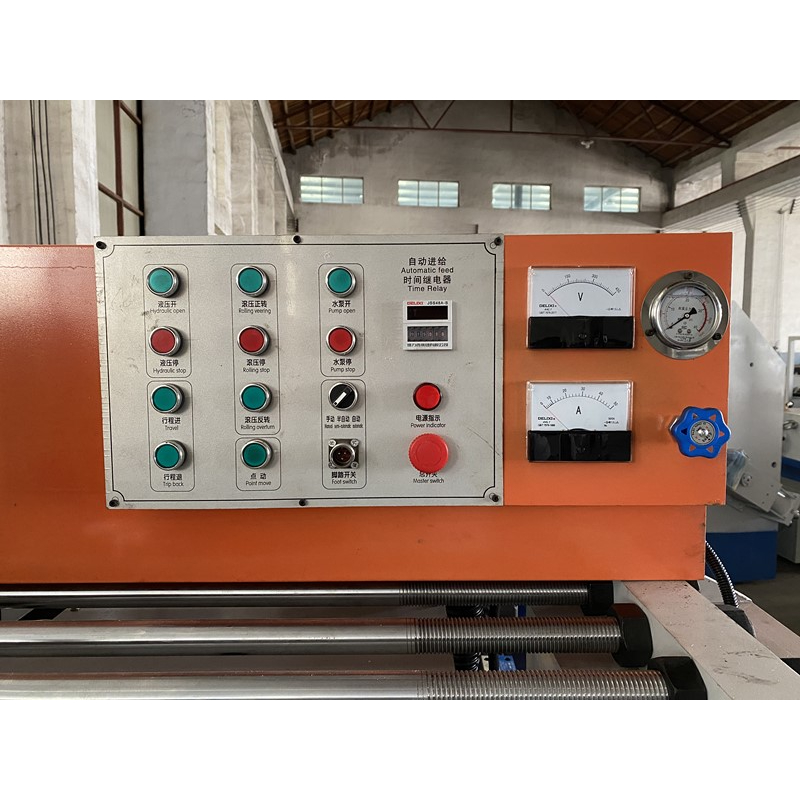
Vendor Comparison: Evaluating CNC Thread Rolling Machine Providers
Choosing the right cnc thread rolling machine vendor requires careful consideration of various factors beyond initial purchase price, including machine capabilities, after-sales support, technological innovation, and adherence to quality standards. Here's a comparative overview of common considerations:
Key Comparison Points for CNC Thread Rolling Machines
| Feature/Service | High-Tier Vendor (e.g., European/Japanese) | Mid-Tier Vendor (e.g., Established Asian/North American) | Entry-Level Vendor |
|---|---|---|---|
| CNC System Integration | Advanced (Siemens 840D, Fanuc 31i), full IoT capability, remote diagnostics. | Standard (Fanuc 0i, Mitsubishi M80), robust, some data logging. | Basic proprietary or older generation CNC, limited connectivity. |
| Machine Rigidity & Build Quality | Heavy cast iron frames, precision ground ways, superior vibration dampening. | Robust welded steel or smaller cast frames, good stability for most uses. | Lighter construction, may impact precision/tool life for demanding work. |
| Accuracy & Repeatability | Industry-leading, consistently achieve ISO 5h/6g, excellent surface finish. | Reliable ISO 6g/ANSI 2A, good for general precision applications. | Acceptable for non-critical applications, may require more QC. |
| Material Compatibility | Wide range, including superalloys, titanium, high-tensile steels. | Standard steels, stainless steels, aluminum, brass. | Softer materials, lower tensile strength steels. |
| Automation Options | Full integration with robotics, auto-loading/unloading, cell manufacturing. | Semi-automatic feeding, compatibility with basic loaders. | Primarily manual loading, limited automation capabilities. |
| After-Sales Support & Training | Global network, 24/7 support, extensive training, spare parts availability. | Regional support, standard business hours, adequate parts supply. | Limited, often reliant on distributors, longer lead times for parts/service. |
For critical B2B applications, investing in a machine from a reputable mid to high-tier vendor often provides the best return on investment through superior performance, longevity, and reliable support. Companies like Motetools, with established product lines like the "anchor bolt stainless rod thread making machine," often position themselves in the mid to high-tier segment by focusing on robust construction, reliable CNC systems, and comprehensive customer service tailored for specific industrial needs.
Customized Solutions and Bespoke Engineering
While standard cnc thread rolling machine models cater to a broad range of applications, many industries require highly specialized solutions. Reputable manufacturers offer extensive customization options to meet unique production challenges, material requirements, and component geometries.
- Specialized Die Design: Custom-designed rolling dies for unconventional thread profiles, multi-start threads, worm gears, or unique material compositions. This includes optimization for specific hardness ranges or surface finishes.
- Integrated Automation: Development of bespoke automated loading and unloading systems, robotic integration for lights-out manufacturing, or in-line integration with other machining processes (e.g., turning, grinding) for a fully automated production cell.
- Enhanced Machine Capacity: Modifications to increase rolling force for extremely hard materials, extended bed lengths for very long components (e.g., lead screws), or increased diameter capacity for large industrial fasteners.
- Environmental Control Systems: Integration of specialized coolant and filtration systems for specific materials or to meet stringent environmental regulations, including closed-loop coolant recycling.
- Advanced Monitoring and Diagnostics: Implementation of real-time sensor arrays for force, temperature, and vibration monitoring, coupled with predictive maintenance analytics to minimize downtime and optimize operational efficiency.
- Tailored Software and HMI: Customization of the CNC interface (Human-Machine Interface) and software to simplify programming for specific part families, integrate with existing ERP/MES systems, or provide detailed production analytics.
These customized solutions ensure that businesses can achieve optimal performance, reduce production costs, and maintain a competitive edge, particularly when dealing with high-value or highly specific component manufacturing. Collaborating closely with a manufacturer's engineering team is essential to define precise requirements and translate them into a tailored machine solution.
Application Case Studies: Real-World Impact
The tangible benefits of a cnc thread rolling machine are best illustrated through real-world applications and customer successes. These case studies highlight the expertise, experience, and authoritativeness of the technology.
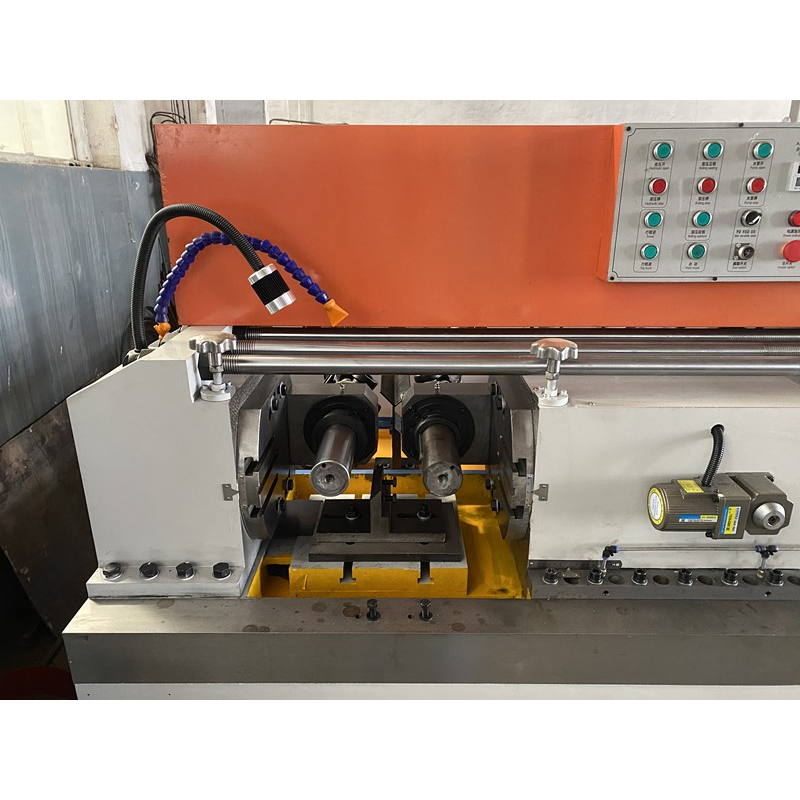
Case Study 1: High-Strength Fasteners for Wind Turbines
A leading manufacturer of wind turbine components faced challenges with fatigue failure in critical foundation bolts produced via traditional thread cutting. The bolts, made from high-tensile alloy steel (e.g., 42CrMo4), required exceptional strength and longevity under cyclic loading. After implementing a specialized hydraulic threading machine with high rolling force and precise CNC control, the client observed a 45% increase in the fatigue life of their M36 bolts. This was confirmed by extensive third-party stress cycle testing adhering to ISO 898-1 standards. The robust threads, produced with a smooth, burnished finish, significantly reduced stress concentration points, extending the service intervals for the wind turbines and substantially improving overall reliability. This partnership underscored the machine's capability in critical energy sector applications.
Case Study 2: Precision Lead Screws for Robotics
A company specializing in industrial robotics required precision lead screws with extremely tight lead accuracy and minimal backlash for their high-speed linear actuators. Traditional machining methods struggled to maintain consistent pitch accuracy over long lengths and often resulted in costly scrap rates. By deploying a high-precision cnc thread rolling machine with a specialized two-die system, the manufacturer achieved lead accuracy within ±5 μm over a 1-meter length, significantly surpassing previous capabilities. The improved surface finish also contributed to reduced friction and extended the operational life of the robotic systems. Customer feedback indicated a noticeable improvement in the smoothness and precision of motion, validating the investment in advanced thread rolling technology.
Case Study 3: Stainless Steel Anchor Rods for Marine Environments
For marine construction projects, a supplier needed to produce corrosion-resistant stainless steel (e.g., 316L) anchor rods with robust threads capable of withstanding saltwater exposure and heavy loads. The initial challenge involved achieving both high strength and excellent corrosion resistance on threaded sections. Using an anchor bolt specific cnc thread rolling machine from Motetools, the client successfully produced thousands of anchor rods where threads not only met tensile strength requirements but also exhibited superior passivity and corrosion resistance. The cold-formed process densified the material, creating a more uniform surface less prone to pitting corrosion, verified by salt spray tests (ASTM B117) and certified by Lloyds Register. This outcome provided a significant competitive advantage in the demanding marine construction market.
Trustworthiness & Customer Support
Building trust in B2B transactions, especially for capital equipment like a cnc thread rolling machine, depends heavily on transparency, reliable support, and clear commitments. Our approach focuses on establishing long-term partnerships through robust service offerings.
Frequently Asked Questions (FAQ)
-
Q: What types of materials can be threaded by your CNC thread rolling machines?
A: Our machines are designed to handle a wide range of ductile materials including carbon steels, alloy steels (e.g., 4140, 8620), stainless steels (304, 316, 316L), aluminum, brass, copper, and some exotic alloys. Specific material compatibility can be confirmed based on your application. -
Q: What is the typical lead time for a new CNC thread rolling machine?
A: Lead times vary depending on machine configuration and customization requirements. Standard models typically have a lead time of 8-12 weeks from order confirmation. Customized solutions may extend to 16-20 weeks. We provide a precise delivery schedule upon order. -
Q: What warranty is provided with your machines?
A: All our machines come with a standard 12-month warranty covering parts and labor from the date of installation or 15 months from shipment, whichever comes first. Extended warranty options are available. -
Q: Do you offer installation and training services?
A: Yes, we provide comprehensive installation and on-site training for your operators and maintenance staff. Our experienced technicians ensure smooth setup and optimal machine operation. Remote support and online resources are also available. -
Q: How do you ensure product quality and adherence to standards?
A: Our manufacturing processes adhere to ISO 9001 quality management systems. Machines undergo rigorous factory acceptance testing (FAT) and adhere to CE safety standards. Threads produced meet international standards such as ISO 965 and ANSI/ASME B1.1, validated through certified inspection equipment.
Lead Time & Fulfillment Details
Our commitment to efficient fulfillment ensures timely delivery of your equipment. Upon receipt of a confirmed order and down payment, our project management team provides a detailed production and delivery schedule. We manage all logistics, including packaging, shipping, and customs documentation, ensuring your cnc thread rolling machine arrives safely and on schedule. For international shipments, we partner with reputable logistics providers to ensure reliable global reach.
Warranty Commitments
We stand behind the quality and durability of our thread rolling machines. Our comprehensive warranty program covers manufacturing defects and component failures. Our service team is readily available to diagnose issues and facilitate rapid resolution, minimizing any potential downtime for your operations. Parts are stocked at our main service centers, ensuring quick dispatch.
Customer Support Information
Our dedicated customer support team is available to assist with technical queries, spare parts orders, and service requests. We offer multi-channel support including phone, email, and a dedicated online portal for registered clients. Remote diagnostic capabilities allow us to troubleshoot many issues without an on-site visit, providing rapid assistance and reducing service costs. Our global network of certified technicians is prepared for on-site interventions when necessary, ensuring your machine's continuous performance.
Conclusion
The cnc thread rolling machine represents a pinnacle of modern manufacturing technology, offering unparalleled precision, strength, and efficiency in producing threaded components. Its cold-forming process delivers superior material properties, making it indispensable for critical applications across diverse industries from aerospace to petrochemical. With advanced CNC controls, comprehensive customization options, and robust after-sales support, investing in this technology is a strategic move for businesses aiming to enhance product quality, optimize production, and maintain a competitive edge in today's demanding industrial landscape.
As manufacturing continues to evolve towards greater automation and higher performance demands, the role of the thread rolling machine, particularly its CNC-driven variants, will only grow in importance, solidifying its position as a cornerstone technology for the future of precision engineering.
References
- Fatigue Strength of Rolled Threads versus Cut Threads. ASME Journal of Manufacturing Science and Engineering.
- Cold Forming Technology: A Comprehensive Guide to Thread Rolling. Society of Manufacturing Engineers (SME) Technical Papers.
- ISO 965: Metric screw threads – Tolerances – Part 1: Principles and basic data. International Organization for Standardization.
- Effects of Thread Rolling on Mechanical Properties of Fasteners. Materials Science and Engineering: A.
- Advanced CNC Control Systems in Precision Manufacturing. Technical Review by Siemens AG.
